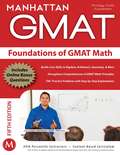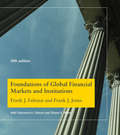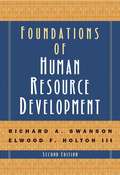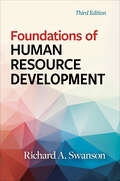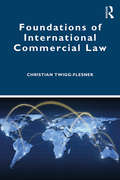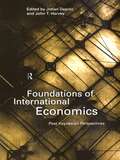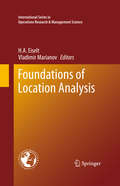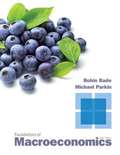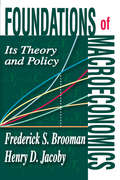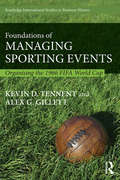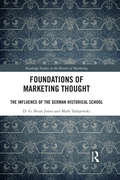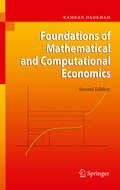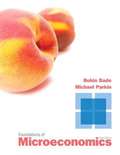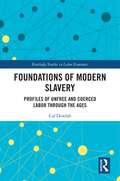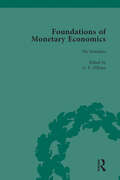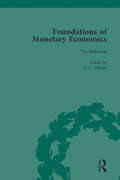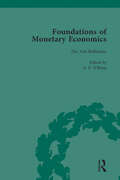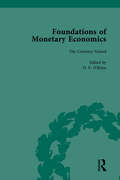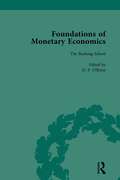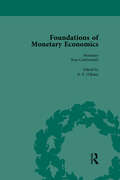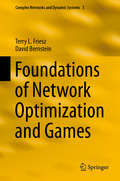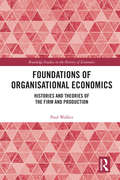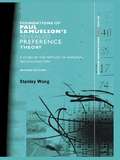- Table View
- List View
Foundations of GMAT Math
by Manhattan GmatManhattan GMAT'â TMs Foundations of Math book provides a refresher of the basic math concepts tested on the GMAT. Designed to be user-friendly for all students, this book provides easy-to-follow explanations of fundamental math concepts and step-by-step application of these concepts to example problems. With ten chapters and over 700 practice problems, this book is an invaluable resource to any student who wants to cement their understanding and build their basic math skills for the GMAT. Purchase of this book includes six months online access to the Foundations of Math Homework Banks consisting of over 400 extra practice questions and detailed explanations not included in the book.
Foundations of Global Financial Markets and Institutions, fifth edition (The\mit Press Ser.)
by Frank J. Fabozzi Frank J. JonesA thoroughly revised and updated edition of a textbook for graduate students in finance, with new coverage of global financial institutions.This thoroughly revised and updated edition of a widely used textbook for graduate students in finance now provides expanded coverage of global financial institutions, with detailed comparisons of U.S. systems with non-U.S. systems. A focus on the actual practices of financial institutions prepares students for real-world problems.After an introduction to financial markets and market participants, including asset management firms, credit rating agencies, and investment banking firms, the book covers risks and asset pricing, with a new overview of risk; the structure of interest rates and interest rate and credit risks; the fundamentals of primary and secondary markets; government debt markets, with new material on non-U.S. sovereign debt markets; corporate funding markets, with new coverage of small and medium enterprises and entrepreneurial ventures; residential and commercial real estate markets; collective investment vehicles, in a chapter new to this edition; and financial derivatives, including financial futures and options, interest rate derivatives, foreign exchange derivatives, and credit risk transfer vehicles such as credit default swaps. Each chapter begins with learning objectives and ends with bullet point takeaways and questions.
Foundations of Human Resource Development (2nd edition)
by Richard A. Swanson Elwood F. Holton IIIFor students, researchers, and practitioners, Swanson (human resource development, U. of Texas at Tyler) and Holton (human resource and leadership development, Louisiana State U.) provide a textbook on human resource development (HRD) that focuses on the fundamentals and foundations of practice that does not focus on best practices. Instead, it addresses models, processes, history, theoretical and philosophical foundations, learning and performance paradigms and models, the role of HRD in high-level organizational and systems-level issues, and training and development and organization development. This edition has been revised, updated, and expanded to include new chapters on component HRD theories, policy and planning, technology, and globalization. Annotation ©2009 Book News, Inc., Portland, OR (booknews.com)
Foundations of Human Resource Development: Profit for Your Workplace and the Environment
by Richard A SwansonThe third edition of this classic is a must-have text for the human resource development (HRD) profession. It has with brand-new material on the impact of technology, globalization, and emerging business trends on HRD practice.Human Resource Development is a large field of practice but a relatively young academic discipline. For the last two decades, Foundations of Human Resource Development has fulfilled the field's need for a complete and thoughtful foundational text. This essential text provides an up-to-date overview of the HRD profession, along with the terminology and processes required for sound HRD research and practice. Readers will gain a basic understanding of• HRD models and theories that support best practice • History and philosophical foundations of the field• HRD's role in learning, performance, and change in organizations This new edition has been updated throughout and contains new chapters on assessment, technology, globalization, and future challenges. Examples of best practices are included, along with variations in core thinking, processes, interventions, tools, and much more. This must-have reference will help both practitioners and academics add clarity to their professional journeys.
Foundations of International Commercial Law
by Christian Twigg-FlesnerFoundations of International Commercial Law provides a fresh analysis of both the contextual features of International Commercial Law and a range of different International Commercial Law instruments. This text covers the various elements which comprise International Commercial Law, the academic debates about the lex mercatoria and harmonisation, as well as a discussion of selected conventions and other instruments. International Commercial Law is concerned with commercial transactions which have an international dimension, for example contracts between parties from multiple jurisdictions. As an area of study, it is characterised by the interaction of a wide range of national and international legal sources which all shape the overall context within which international commercial contracts are made and performed. This book focuses on the international legal sources in particular. It first explores all the different elements which together comprise the context of international commercial transactions, before examining the process of making International Commercial Law. Specific instruments of International Commercial Law discussed in the book include the conventions on the international sale of goods, agency, financial leasing, factoring, receivables financing and secured interests in mobile equipment, together with the UNIDROIT Principles of International Commercial Contracts and documentary credits. There are separate chapters on private international law and international commercial arbitration, and a final chapter exploring the existing and potential impact of the digital economy on International Commercial Law. Offering a detailed overview of the main themes and key aspects of International Commercial Law, this book is for readers who are new to the subject, whether undergraduate or postgraduate students, legal scholars, practitioners or policymakers.
Foundations of International Economics: Post-Keynesian Perspectives
by John T. Harvey Johan DeprezThis unique collection presents a Post-Keynesian perspective on international economics and trade. All the major areas in international economics are covered, with the Post-Keynesian approach giving a welcome fresh perspective. The book is divided into five main sections: * foreign trade * open economy * international payments systems * exchange rate determination * development. Unavailable elsewhere, the readings present original, state-of-the-art research by leading Post-Keynesian scholars. Contributors include: Philip Arestis, Robert Blecker, Paul Davidson, Sheila Dow, Bruce Elmslie, Ilene Grabel John McCombie Eleni Paliginis, A.P. Thirlwall L. Randall Wray Johan Deprez, John T. Harvey,
Foundations of Location Analysis (International Series in Operations Research & Management Science #155)
by H. A. Eiselt Vladimir MarianovLocation analysis has matured from an area of theoretical inquiry that was designed to explain observed phenomena to a vibrant field which can be and has been used to locate items as diverse as landfills, fast food outlets, gas stations, as well as politicians and products in issue and feature spaces. Modern location science is dealt with by a diverse group of researchers and practitioners in geography, economics, operations research, industrial engineering, and computer science. Given the tremendous advances location science has seen from its humble beginnings, it is time to look back. The contributions in this volume were written by eminent experts in the field, each surveying the original contributions that created the field, and then providing an up-to-date review of the latest contributions. Specific areas that are covered in this volume include: * The three main fields of inquiry: minisum and minimax problems and covering models * Nonstandard location models, including those with competitive components, models that locate undesirable facilities, models with probabilistic features, and problems that allow interactions between facilities * Descriptions and detailed examinations of exact techniques including the famed Weiszfeld method, and heuristic methods ranging from Lagrangean techniques to Greedy algorithms * A look at the spheres of influence that the facilities generate and that attract customers to them, a topic crucial in planning retail facilities * The theory of central places, which, other than in mathematical games, where location science was born
Foundations of Macroeconomics
by Robin Bade Michael ParkinA practice-oriented learning system that breaks the traditional textbook mold. To help readers focus on the most important concepts--and effectively practice application of those concepts--Foundations of Macroeconomics is structured around a Checklist/Checkpoint system. The result is a patient, confidence-building textbook that prepares readers to use economics in their everyday life, regardless of what their future career will be.
Foundations of Macroeconomics: Its Theory and Policy
by Frederick S. BroomanEmphasizing careful, lucid explanation rather than the lavish use of cryptic graphs and mathematics, and combining the rigor of statement of the best American theoretical work with the extraordinary clarity of the best English scientific writing, this compact, readable, well-integrated work is a leading text for courses in macroeconomics. A completely rewritten version of Brooman's classic English text, the book has been revised and expanded specifically for use in the United States, with American examples and usages, and includes new chapters on money and monetary flows and their consequences. The book covers every aspect of economic theory dealing with the determination of total output and employment, the general price level, and the rate of economic growth. It examines theories of consumer behavior and business investment, the demand and supply of money and their effects on interest rates and the price level; the determination of the level of employment and wages; the possibilities of fluctuations in output and employment; and the forces making for growth of the economy. The effects of foreign trade on the domestic economy are brought in, and the possibilities of using government expenditure and taxation as a means of stabilizing the economy are examined. Theories of consumption, investment, trade, money and interest are tied together in a thorough discussion of income determination, and whenever possible, empirical evidence is produced as a check on theoretical relationships. Algebraic symbols are used as a space-saving device; none but the simplest algebra is employed, and readers with an elementary knowledge of mathematics will find no difficulty in following the argument of the book. It is organized for a one semester course, both in terms of the sequence of materials and the relative number, length, and difficulty of the chapters. The object throughout is to make the exposition highly readable and to provide clear definitions and explanations of the main concepts found in this important branch of economic theory. The result is a book of the highest level.
Foundations of Managing Sporting Events: Organising the 1966 FIFA World Cup (Routledge International Studies in Business History #33)
by Kevin D Tennent Alex G. Gillett2016 marks the 50th anniversary of the 1966 FIFA World Cup, hosted in England. Unlike previous literature, which has tended to focus activities on the field, this book brings an institutional level approach to organizing the 1966 FIFA World Cup and examines the management process in the buildup and execution of the event. This intriguing new volume looks at the first significant UK government intervention in football and how this created a significant legacy as the government started to take a real interest in leisure facilities and stadium safety as policy areas after this competition. Foundations of Managing Sporting Events will be of considerable interest to research academics working on aspects of post war British, Imperial, and World history including sport, social, business, economic, and political history.
Foundations of Marketing
by O. C. Ferrell William M. PridePopular with readers from all backgrounds and interest levels, FOUNDATIONS OF MARKETING, 6th Edition introduces you to the essentials and latest trends in marketing with strong visuals and stimulating, timely discussions. Meaningful coverage of current marketing strategies and concepts includes social media, entrepreneurship, sustainability, globalization, customer relationship management, supply chain management, and e-commerce models. Emerging topics, such as social and environmental responsibility, entrepreneurship, and marketing during transitional times depict the changing nature of business, keeping you in touch with and prepared for a competitive world. Illustrating the issues with captivating photos, screenshots, advertisements, and examples from real life, FOUNDATIONS OF MARKETING, 6th Edition also offers a variety of modern learning supplements, such as podcasts, videos, and an interactive marketing plan, to help you develop the practical decision-making skills you need for professional success.
Foundations of Marketing Thought: The Influence of the German Historical School (Routledge Studies in the History of Marketing)
by Mark Tadajewski D.G. Brian JonesThe study and teaching of marketing as a university subject is generally understood to have originated in America during the early 20th century emerging as an applied branch of economics. This book tells a different story describing the influence of the German Historical School on institutional economists and economic historians who pioneered the study of marketing in America and Britain during the late 19th and early 20th centuries. Drawing from archival materials at the University of Wisconsin, Harvard Business School, and the University of Birmingham, this book documents the early intellectual genealogy of marketing science and traces the ideas that early American and British economists borrowed from German scholars to study and teach marketing. Early marketing scholars both in America and Britain openly credited the German School, and its ideology based on social welfare and distributive justice was a strong motivation for many institutional economists who studied marketing in America, predating the modern macro-marketing school by many decades. Challenging many traditional beliefs, this book provides an authoritative new narrative of the origins of marketing thought. It will be of great interest to educators, scholars and advanced students with an interest in marketing theory and history, and in the history of economic thought.
Foundations of Mathematical and Computational Economics
by Kamran DadkhahThis is a book on the basics of mathematics and computation and their uses in economics for modern day students and practitioners. The reader is introduced to the basics of numerical analysis as well as the use of computer programs such as Matlab and Excel in carrying out involved computations. Sections are devoted to the use of Maple in mathematical analysis. Examples drawn from recent contributions to economic theory and econometrics as well as a variety of end of chapter exercises help to illustrate and apply the presented concepts.
Foundations of Microeconomics (6th Edition)
by Robin Bade Michael ParkinTo help students in understanding the foundations of economic principles that can help them navigate the economic forces and guide their decisions.
Foundations of Modern Slavery: Profiles of Unfree and Coerced Labor through the Ages (Routledge Studies in Labour Economics)
by Caf DowlahThis is an academic inquiry into how labor power has been dehumanized and commodified around the world through the ages for capital accumulation and industrialization, and colonial and post-colonial economic transformation. The study explores all major episodes of slaveries beginning from the ancient civilizations to the end of Transatlantic Slave Trade in the eighteenth century; the worlds of serfdoms in the context of Western Europe, Eastern Europe, and Russia; the worlds of feudalisms in the context of Latin America, Japan, China, and India; the worlds of indentured servitudes in the context of the Europeans, the Indians, and the Chinese; the worlds of guestworkers in the contexts of the United States and Western Europe; the worlds of migrant labor programs in the context of the Gulf States; and the contemporary world of neoslavery focusing on human trafficking in both developing and developed countries, and forced labor in global value chains. The book is designed not only for students and academia in labor economics, labor history, and global socio-economic and political transformations, but also for the intelligent and inquiring policy makers, reformers, and general readers across the disciplinary pursuits of Economics, Political Science, History, Sociology, Anthropology, and Law.
Foundations of Monetary Economics, Vol. 1: The Founders
by D P O'BrienA multi-volume work which examines key texts from literature, providing a useful resource for the study of the foundations of monetary economics from writers such as Ricardo, Cantillon and Hume.
Foundations of Monetary Economics, Vol. 2: The Bullionists
by D P O'BrienA multi-volume work which examines key texts from literature, providing a useful resource for the study of the foundations of monetary economics from writers such as Ricardo, Cantillon and Hume.
Foundations of Monetary Economics, Vol. 3: The Anti-Bullionists
by D P O'BrienA multi-volume work which examines key texts from literature, providing a useful resource for the study of the foundations of monetary economics from writers such as Ricardo, Cantillon and Hume.
Foundations of Monetary Economics, Vol. 4: The Currency School
by D P O'BrienA multi-volume work which examines key texts from literature, providing a useful resource for the study of the foundations of monetary economics from writers such as Ricardo, Cantillon and Hume.
Foundations of Monetary Economics, Vol. 5: The Banking School
by D P O'BrienA multi-volume work which examines key texts from literature, providing a useful resource for the study of the foundations of monetary economics from writers such as Ricardo, Cantillon and Hume.
Foundations of Monetary Economics, Vol. 6: Monetary Non-Conformists
by D P O'BrienA multi-volume work which examines key texts from literature, providing a useful resource for the study of the foundations of monetary economics from writers such as Ricardo, Cantillon and Hume.
Foundations of Network Optimization and Games
by David Bernstein Terry L. FrieszThis is a book about infrastructure networks that are intrinsically nonlinear. The networks considered range from vehicular networks to electric power networks to data networks. The main point of view taken is that of mathematical programming in concert with finite-dimensional variational inequality theory. The principle modeling perspectives are network optimization, the theory of Nash games, and mathematical programming with equilibrium constraints. Computational methods and novel mathematical formulations are emphasized. Among the numerical methods explored are network simplex, gradient projection, fixed-point, gap function, Lagrangian relaxation, Dantzig-Wolfe decomposition, simplicial decomposition, and computational intelligence algorithms. Many solved example problems are included that range from simple to quite challenging. Theoretical analyses of several models and algorithms, to uncover existence, uniqueness and convergence properties, are undertaken. The book is meant for use in advanced undergraduate as well as doctoral courses taught in civil engineering, industrial engineering, systems engineering, and operations research degree programs. At the same time, the book should be a useful resource for industrial and university researchers engaged in the mathematical modeling and numerical analyses of infrastructure networks.
Foundations of Organisational Economics: Histories and Theories of the Firm and Production (Routledge Studies in the History of Economics)
by Paul WalkerFoundations of Organisational Economics: Histories and Theories of the Firm and Production delves into a range of key topics to do with the history of the mainstream approach to the theory of production and the theory of the firm. This includes the frameworks used to analyse production, the division of labour and its application to the firm and the development of the neoclassical model of production. The first topic explored is the change from a normative approach to a largely positive approach to the analysis of the theory of production, which occurred around the seventeenth century. The next topic is an examination of the relationship (or the lack of a relationship) between the division of labour and the theory of the firm. In the fourth chapter, the focus is on the development of the proto-neoclassical approach to production. Here, the development of the theories of monopoly, oligopoly and perfect competition are discussed, as well as the theory of input utilisation. Chapter 5 looks at Marshall’s idea of the representative firm, which was the main early neoclassical approach to the theory of industry-level production. The penultimate chapter considers the criticisms made of the neoclassical model between 1940 and 1970. This work is an illuminating reference for students and researchers of the history of economic thought, industrial organisation, microeconomic theory and organisational studies.
Foundations of Paul Samuelson's Revealed Preference Theory: A study by the method of rational reconstruction (Routledge INEM Advances in Economic Methodology)
by Stanley WongOriginally published over two decades ago, this classic text within the philosophy of economics is a tour de force against revealed preference. It critically examines the research programme carried out by the Nobel Prize winner Paul Samuelson on the revealed preference approach to the theory of consumer behaviour. It also challenges two essential premises: * that the programme has been completed * that the various contributions of Samuelson are mutually consistent. This text contains a new preface by Wong, in which he provides a detailed insight into the origins of his pioneering text, and a new introduction from Philip Mirowski, analyzing the impact The Foundation of Paul Samuelson’s Revealed Preference Theory has had on the discipline of economics as well as explaining why it remains core reading for economists today. The defining statement of economic method, this book will be of interest to economists everywhere.
Foundations of Personal Finance (Eighth Edition)
by Sally R. CampbellWhether you teach classes in Family and Consumer Sciences or Business, Foundations of Personal Finance is the right text for you. It introduces students to fundamental economic concepts so they can better understand an increasingly complex world. They learn how to identify and manage resources to achieve their own economic goals. A chapter covers each personal finance area: taxes, credit, insurance, savings, investments, and financial institutions. Students also learn how to make wise decisions about the things that affect many household budgets: food, clothing, transportation, housing, technology, and health. The text challenges students to plan their futureswith education, job training, and careersand help make environmental resources available for future generations. Each chapter contains colorful photos and charts, compelling case studies, career profiles, reports about current global issues, and related content from other academic areas.
